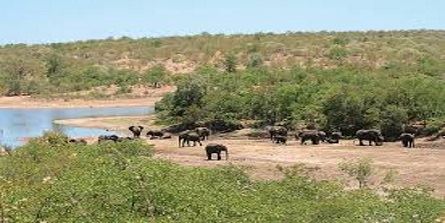While many safari destinations in Africa tend to have a peak season over the winter months, the greater Kruger National Park is a year-round safari destination. Here’s why.
Kim Beyers, the owner of Kim Beyers Representation which represents some properties in the Sabi Sands, points out that there’s no longer a low season in the Sabi Sands and some properties have a flat rate for 2017, with no low-season or winter rates. Wild Wings Safaris Director, Onne Vegter, also highlights that there’s no real difference in pricing, with only a few lodges offering reduced rates or specials in the low season.
“For many years Greater Kruger considered May to September the low season, and it was common practice to offer winter specials during these months,” says Vegter. “In neighbouring countries like Botswana and Zimbabwe, June to October is traditionally the peak season, and the Greater Kruger is now also catching up to the fact that these months are often the busiest and most popular months for safari tourists.” Vegter says finding availability between July and September is an issue, especially at the lower end of the market.
He argues that the greater Kruger National Park is a year-round safari destination, adding that there are fewer differences between peak and off-peak seasons than in many other African game parks. Likewise, Nik Lloyd-Roberts, Commercial Manager at Federal Airlines, agrees that there isn’t really an off-peak season. He says the Sabi Sands especially, is busy all year round.
“The Sabi Sands and Greater Kruger area have been very successful at marketing the destination collaboratively as opposed to as individual products," he says. “They have done very well in establishing the Sabi Sands as the most exceptional place for game viewing in South Africa, which it is.” He adds that the properties in the Sabi Sands are all of a high calibre, offering great service.
Some of the best months

“The truth is that the dry winter season is a great time to be on safari, and since it includes the European and American summer holidays, it is no secret that the peak safari season is between June and October.” He points out that there is usually another peak season in December. “The lowest season in terms of visitor numbers is during the rainy season, between January and March.” However, Vegter points out that during these months, most lodges are still priced at high-season rates, with only a few offering lower rates.
Rina Cilliers, GM Sales, Marketing & Reservations at Legend Lodges, also points out that off-peak periods are ideal for guests who would like to avoid a lot of people at their lodge. She says the prices are also better. “It is much easier to get availability on the specific rooms you want and also to book the various activities you would like to do. Travelling to the lodge and resort might also be less expensive due to its being off-peak season.”
According to Vegter, the advantages of traveling during the rainy months between January and March include fewer tourists and therefore less congestion at sightings, fantastic birding opportunities, and plenty of baby animals to see. “The bush is lush and green during this time, and there are often dramatic cloud formations and thunderstorms,” he says. Lloyd-Roberts also points out that the summer months offer a greener bushveld, which many visitors may enjoy.
January is also when the impalas give birth and visitors can also expect to see many other baby animals, like wildebeest, warthogs, monkey and baboons, says Vegter. “It's cuteness overload! This is a time of abundance for both predators and prey, and therefore also a time of abundant sightings for the safari tourist.”
Andrew Iles, CEO of Ashtons Tours, Safaris & Shuttles, says the very best time to visit the Greater Kruger area is the off-peak period of May to June. “The bush is normally beautiful after the rainy season, the days are not oppressively hot which is great for guided activities, especially bush walks, and the number of people at the lodges and in the reserves are greatly reduced when compared with the peak safari seasons.” He says prices are sometimes reduced during that period to attract more guests and the game viewing is still excellent. “Tourists who are not bound by specific holiday periods should do themselves a favour and schedule their Greater Kruger safaris for May to June, or even April to July.
Vegter also points out that in May some lodges still offer low-season rates and it is not as busy as June to August. “It is the start of the dry season, the days are likely to be mostly sunny and warm, while the nights are chilly. Availability during May is usually good, and with fewer tourists, congestion at sightings is less of a problem,” he says.
Andre van Heerden, owner of Summerfields Rose Retreat and Spa, also advocates wintertime for safaris in the Lowveld. “The days are temperate, not too hot with low humidity, and the views open with vistas across the escarpment to Mozambique. The bush is sparse and game viewing the best one can hope for,” he says. Lloyd-Roberts adds that because water is scarcer in winter, the season often allows for more sightings.
“November is also a very rewarding time, it falls just between the dry season peak period which ends in October, and the December or Christmas peak period,” says Vegter, He points out that, while it is not as quiet as January to March, it is one of the best months for visiting greater Kruger. “After the first rains have arrived, the bush quickly turns to an emerald green, but the grass is still short so visibility is good. This change of seasons is a very special time to be in the bush,” he says.
























